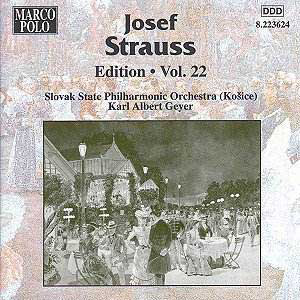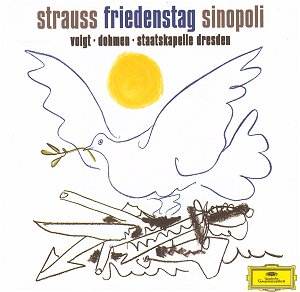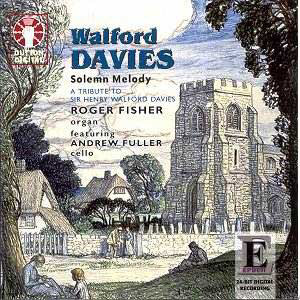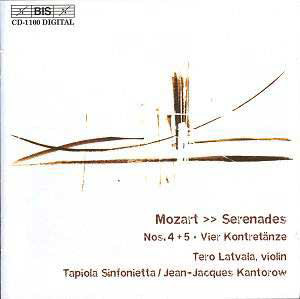 Composer: Josef Strauss
Composer: Josef Strauss
Works: Einzugs Marsch, Veterans, Eccentrics, Flinserin (Sequins) waltzes, Polka of the Elves, Coincidentals, Patti, Die Kosende, Lock and Elfen, Rendezvous, Sofien quadrilles
Performers: Slovak State Philharmonic Orchestra (Kosice) / Karl Albert Geyer
Recording: Marco Polo 8.223624 [62’26”]
Label: Naxos
Josef Strauss, often overshadowed by his more famous brother Johann II, emerges in this latest installment of the Marco Polo series as a composer whose contributions to the Viennese waltz tradition deserve renewed attention. The collected works in Volume 22 provide a delightful snapshot of the lighter, yet intricately crafted dance music that characterized mid-19th century Vienna. This release encapsulates various forms of the Strauss family’s repertoire, including marches, waltzes, polkas, and quadrilles, all of which reflect the social and cultural milieu of their time.
The performances under the baton of Karl Albert Geyer display a commendable understanding of the stylistic nuances required for this repertoire. The Slovak State Philharmonic Orchestra of Kosice articulates the rhythmic intricacies and melodic charm inherent in Strauss’s music with an admirable clarity. The opening track, the “Einzugs Marsch,” marked by its vibrant orchestration, sets an exuberant tone for the album. Geyer’s tempo choices allow the march to breathe, creating a sense of anticipation evocative of a military homecoming.
In terms of interpretation, Geyer’s approach to the waltzes is particularly noteworthy. The “Veterans” waltz pays homage to the soldiers of 1848 with an elegiac quality, yet it is buoyed by a lively tempo that captures the celebratory spirit of the occasion. Conversely, the “Eccentrics” waltz, while somewhat conventional, is executed with a freshness that belies its age. The standout piece among the waltzes is undoubtedly “Flinserin,” where the orchestra’s deft handling of the light, playful motifs demonstrates their technical prowess. The playful interplay between strings and woodwinds is particularly delightful, drawing the listener into the whimsical narrative of the dance.
The polkas, including the “Polka of the Elves” and the homage to soprano Adelina Patti, showcase the orchestra’s rhythmic precision and ability to convey wit and charm. The former is infused with a delightful sense of humor, where the dynamic contrasts between the sections heighten the playful spirit of the music. The polkas maintain a brisk pace that ensures the listener remains engaged, avoiding the potential pitfalls of monotony that can plague less inspired performances.
Sound quality on this recording is commendable, with a clear balance between the orchestral sections that allows for the intricate counterpoint inherent in Strauss’s music to emerge without muddiness. The engineering captures the warmth of the strings while ensuring that the brass sections cut through with a bright, celebratory sound, a hallmark of the Strauss orchestral style.
This collection stands as a valuable addition to the growing catalog of Josef Strauss’s works, revealing the composer’s craftsmanship through engaging performances and thoughtful interpretations. While none of these pieces may supplant the more established works in the Strauss repertoire, they certainly enrich the understanding of a composer whose talents merit wider recognition. For devotees of the Strauss legacy, this disc is a delightful journey through the lesser-known gems of the Viennese dance tradition, performed with affection and competence.



